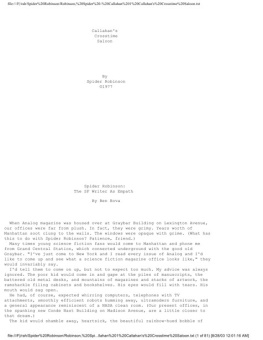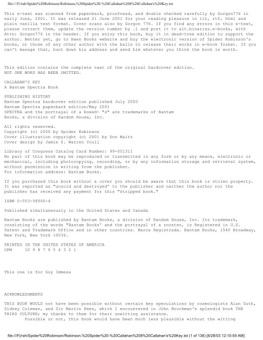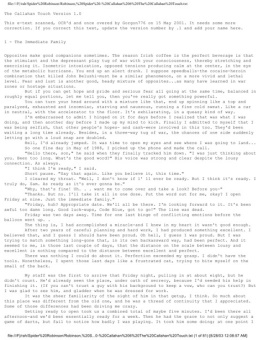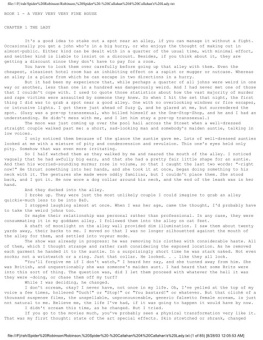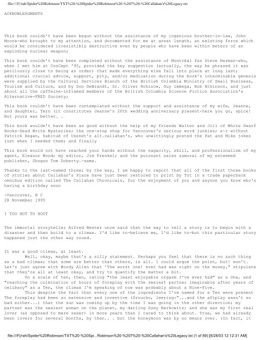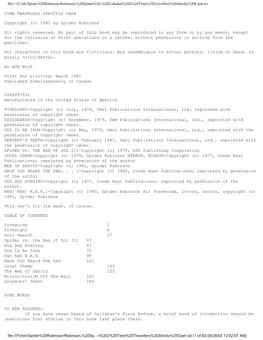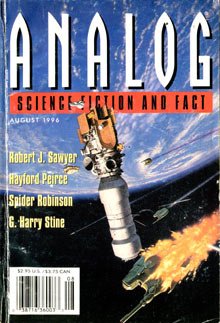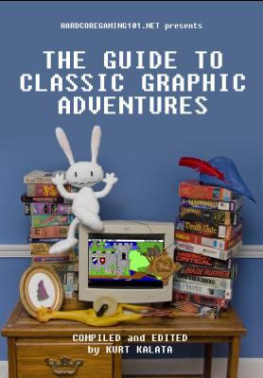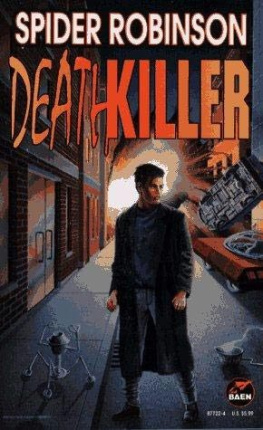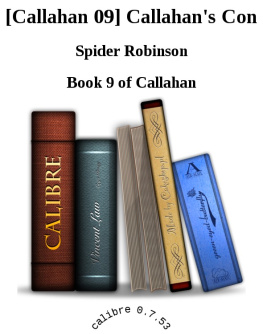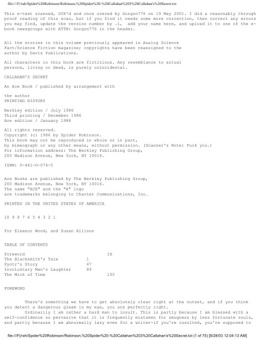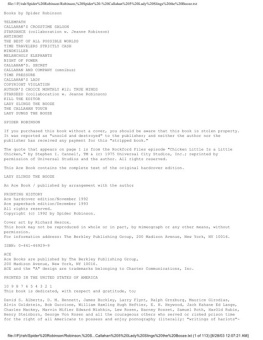Spider Robinson - Callahans Crosstime Saloon
Here you can read online Spider Robinson - Callahans Crosstime Saloon full text of the book (entire story) in english for free. Download pdf and epub, get meaning, cover and reviews about this ebook. year: 1999, publisher: Tor Science Fiction, genre: Detective and thriller. Description of the work, (preface) as well as reviews are available. Best literature library LitArk.com created for fans of good reading and offers a wide selection of genres:
Romance novel
Science fiction
Adventure
Detective
Science
History
Home and family
Prose
Art
Politics
Computer
Non-fiction
Religion
Business
Children
Humor
Choose a favorite category and find really read worthwhile books. Enjoy immersion in the world of imagination, feel the emotions of the characters or learn something new for yourself, make an fascinating discovery.
- Book:Callahans Crosstime Saloon
- Author:
- Publisher:Tor Science Fiction
- Genre:
- Year:1999
- Rating:4 / 5
- Favourites:Add to favourites
- Your mark:
- 80
- 1
- 2
- 3
- 4
- 5
Callahans Crosstime Saloon: summary, description and annotation
We offer to read an annotation, description, summary or preface (depends on what the author of the book "Callahans Crosstime Saloon" wrote himself). If you haven't found the necessary information about the book — write in the comments, we will try to find it.
Callahans Crosstime Saloon — read online for free the complete book (whole text) full work
Below is the text of the book, divided by pages. System saving the place of the last page read, allows you to conveniently read the book "Callahans Crosstime Saloon" online for free, without having to search again every time where you left off. Put a bookmark, and you can go to the page where you finished reading at any time.
Font size:
Interval:
Bookmark:
Callahans Crosstime
Saloon
By
Spider Robinson
1977
Spider Robinson:
The SF Writer As Empath
By Ben Bova
When Analog magazine was housed over at Graybar Building on Lexington Avenue, our offices were far from plush. In fact, they were grimy. Years worth of Manhattan soot clung to the walls. The windows were opaque with grime. (What has this to do with Spider Robinson? Patience, friend.) Many times young science fiction fans would come to Manhattan and phone me from Grand Central Station, which connected underground with the good old Graybar. Ive just come to New York and I read every issue of Analog and Id like to come up and see what a science fiction magazine office looks like, they would invariably say.
Id tell them to come on up, but not to expect too much. My advice was always ignored. The poor kid would come in and gape at the piles of manuscripts, the battered old metal desks, and mountains of magazines and stacks of artwork, the ramshackle filing cabinets and bookshelves. His eyes would fill with tears. His mouth would sag open.
He had, of course, expected whirring computers, telephones with TV
attachments, smoothly efficient robots humming away, ultramodern furniture, and a general appearance reminiscent of a NASA clean room. (Our present offices, in the spanking new Conde Nast Building on Madison Avenue, are a little closer to that dream.)
The kid would shamble away, heartsick, the beautiful rainbow-hued bobble of
his imagination burst by the sharp prick of reality.
Still, despite the cramped quarters and the general dinginess, we managed to put out an issue of Analog each month, and more readers bought it than any other science fiction book, magazine, pamphlet, or cuniform tablet ever published.
And then came Spider Robinson.
Truth to tell, I dont remember if he sent in a manuscript through the mail first, or telephoned for an appointment to visit the office. No matter. And now hes off in Nova Scotia, living among the stunted trees and frost heaves, where nobody-not even short-memoried editors-can reach him easily.
Anyway, in comes Spider. I look up from my desk and see this lank, almost-cadaverous young man, bearded, long of hair, slightly owlish behind his eyeglasses, sort of grinning quizzically, as if he didnt know what to expect.
Neither did I.
But I .thought, At least he wont be put off by the interiordecor.
You have to understand that those same kids who expected Analogs office to look like an out-take from 2001: A Space Odyssey also had a firm idea of what an Analog writer should look like: a tall, broadshouldered, jutjawed, steelyeyed hero who can repair a starships inertial drive with one hand, make friends with the fourteen-legged green aliens of Arcturus, and bring the warring nations of Earth together under a benignly scientific world government-all at the same time, while wearing a metallic mesh jumpsuit and a cool smile.
Never mind that no SF writer ever looked like that. Well, maybe Robert A.
Heinlein comes close, and he could certainly do all of those things if hed just stop writing for a while. But Asimov is a bit less than heroic in stature; Silverberg shuns politics; Bradbury doesnt even drive a car, much less a starship.
Nevertheless, this was the popular conception of a typical Analog writer.
Spider Robinson was rather wider of that mark than most.
He had a story with him, called The Guy with the Eyes. There wasnt much science fiction in it. But it was one helluva good story. About a crazy bunch of guys who get together at a truly unique place called Callahans.
We went to lunch, and Spider began telling me how he worked nights guarding a sewer way out on Long Island. Far from being a dropout, he was writing stories and songs, as well as sewer-sitting. Hes a worker, and he knows science fiction very well, a fact that surprised a lot of people when he started reviewing books for Galaxy magazine. Hes also a guitar-strummin singer, and I found out how good he is at many a party. But that was later.
I bought The Guy with the Eyes. When it came out in Analog, it caused a mild ripple among our readers. I had expected some of them to complain because it wasnt galaxy-spanning superheroic science fiction. Instead, they wrote to tell me that they got a kick out of Callahans Place. How about more of the same?
Now, an editor spends most of his time reading lousy stories. John Campbell, who ran Analog (nee Astounding) for some thirty-five years, often claimed to hold the Guinness Book of Records championship for reading more rotten SF
stories than anyone else on Earth. (Most likely he could have expanded his claim to take in the entire solar system, but John was a conservative man in some ways.)
So when you spend your days and nights-especially the nights-reading poor stories, its a pleasure to run across somebody like Spider: a new writer who has a good story to tell. It makes all those lousy stories worthwhile. Almost.
Its a thrill to get a good story out of the weeks slushpile-that mountain of manuscripts sent in by the unknowns, the hopefuls, the ones who want to be writers but havent written anything publishable yet.
But the real thrill comes when a new writer sends in his second story and its even better than the first one. That happens most rarely of all. It happened with Spider. He brought in the manuscript of The Time Traveler, and I knew I was dealing with a pro, not merely a one-time amateur.
We talked over the story before he completed the writing of it. He warned me that he couldnt really find a science fiction gimmick to put into the story. I fretted over that (Analog is, after all, a science fiction magazine), but then I realized that the protagonist was indeed a time traveller; his time machine ,
was a prison.
Just about the time the story was published, thousands of similar time travelers returned to the U.S. from North Vietnamese prisons. Spiders story should have been required reading for all of them, and their families.
Sure enough, we got a few grumbles from some of our older readers. One sent a stiff note, saying that since the story wasnt science fiction atall, and he was paying for science fiction stories, would we please cancel his subscription. I wrote him back pointing out that we had published the best science fiction stories in the world for more than forty years, and for one single story hes cancelling his subscription? He never responded, and I presume that hes been happy with Analog and Spider ever since.
Callahans Place grew to be an institution among Analogs readers, and you can see it-and the zanies who frequent Callahans-in all their glory in this collection of stories. What youre reading is something truly unique, because the man who wrote these stories is an unique writer. Its been my privilege to publish most of these stories in Analog. Several others are brand new and havent been published anywhere else before.
Its also been a privilege, and a helluva lot of fun, to get to know Spider personally. To watch him develop as a writer and as a man.
He went from guarding sewers to working for a Long Island newspaper. When that job brought him to a crisis of conscience-work for the paper and slant the news the way the publisher demanded, or get out-his conscience won. He took the big, big step of depending on nothing but his writing talent for an income. But Spider writes; he doesnt talk about writing, he works at it.
It wasnt all that easy. He had personal problems, just like everybody else does. Not every story he put on paper sold immediately. Money was always short.
One summer afternoon he met a girlfriend who was coming into town from Nova Scotia. She had never been to New York before. Spider greeted her at Penn Station with the news that his lung had just collapsed and he had to get to a hospital right away, he hoped she didnt mind. The young lady (her name is Jeanne) not only got him to a hospital; she ended up marrying him. Now they both live in Nova Scotia, where city-born Spider has found that he loves the rural splendor of farm life. (Me, I stay in the wilds of Manhattan, where all youve got to worry about is strikes, default, muggings and equipment failure. Nova Scotia? In winter? Ugh!)
Next pageFont size:
Interval:
Bookmark:
Similar books «Callahans Crosstime Saloon»
Look at similar books to Callahans Crosstime Saloon. We have selected literature similar in name and meaning in the hope of providing readers with more options to find new, interesting, not yet read works.
Discussion, reviews of the book Callahans Crosstime Saloon and just readers' own opinions. Leave your comments, write what you think about the work, its meaning or the main characters. Specify what exactly you liked and what you didn't like, and why you think so.

